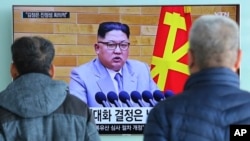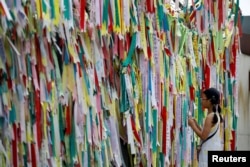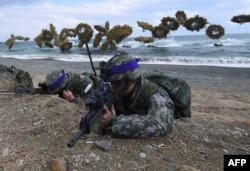North Korea has accepted South Korea’s offer of high-level talks next Tuesday, Jan. 9, at the truce village of Panmunjom in the heavily fortified demilitarized zone dividing the two Koreas.
According to South Korea’s Unification Ministry, on Friday morning, North Korea sent a message saying it would accept Seoul’s offer to meet at the border village to discuss Olympic cooperation and how to improve overall ties.
Ministry spokesman Baik Tae-hyun said it was expected the two Koreas will use a recently restored cross-border communication channel to determine who will head their respective delegations next week.
Any dialogue between North and South is seen as a positive step in improving relation in Korean Peninsula, which would contribute to the overall stability in the region.
A North Korea expert, Yang Mu-jin, a professor at the University of North Korean Studies in Seoul, said Friday that the breakthrough could give both sides the chance to discuss security issues, “make claims and listen to the other.”
“Both the South and the North have considerable interest in opening South-North relations and have the intention to improve bilateral ties, so this time’s high-level talks will focus on the matter of (North Korea’s participation in the) Pyeongchang Olympics and also discuss other security issues,” Yang said. “However, it is expected that the two sides will reach an agreement on the North’s participation in the Olympics, but for other issues including security matters, each side will make claims and listen to the other.”
Yang believes the return to formal dialogue between the communist North and the democratic South could “lead to a positive direction toward denuclearizing the Korean Peninsula.”
“For the South, denuclearization is important, and for the North negotiation with the U.S. is important,” Yang said. “Thus, with the success of the Pyeongchang Olympics as a turning point, North and South will restore relations, and the South will persuade both Pyongyang and Washington to encourage North-U.S. dialogue. Furthermore, there is a possibility that this will lead to a positive direction toward denuclearizing the Korean Peninsula and establishing peace through four-party talks and six-party talks in the future.”
The North’s announcement Friday came shortly after United States and South Korea decided to delay joint military exercises until after the Pyeongchang Winter Olympics next month.
South Korea’s Blue House (executive office) said Thursday the decision came during a phone call between U.S. President Donald Trump and President Moon Jae-in.
A White House statement said both leaders “agreed to de-conflict the Olympics and our military exercises so that [the] United States and Republic of Korea forces can focus on ensuring the security of the games.”
Isabela Cocoli contributed to this report.









